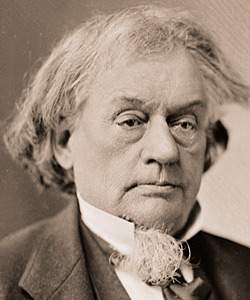Robert Augustus Toombs (American National Biography)
Scholarship
Ranking with the most important members of the Senate in the 1850s, Toombs contributed little of a positive nature to the South or the Georgia he loved so well in the Confederacy's struggle for nationhood. An army friend, Major Raphael J. Moses, recalled that his "impulses were generous and noble, his faults were bluster and a vivid imagination not always hampered by facts." Howell Cobb thought he had the finest mind of his generation "but lacked balance." According to T. C. De Leon, a government wit claimed that Toombs "disagrees with himself between meals." Fiery, erratic, and impulsive, he professed in the 1850s to love the Union but sometimes spoke like a fire-eater. He had "basically . . . conservative instincts," as befit his social class, but was a man who could "explode in any direction" in a crisis (Thompson, p. 66). This fatal flaw, a "tendency" under stress "to slide into the role of extremist" (Thompson, p. 146), denied him greatness. Toombs was one of the last of a generation of southern mavericks.
Michael Chesson, "Toombs, Robert Augustus," American National Biography Online, February 2000, http://www.anb.org/articles/04/04-00991.html.
Robert Augustus Toombs (Congressional Biographical Directory)
Reference
TOOMBS, Robert Augustus, a Representative and a Senator from Georgia; born in Wilkes County, Ga., July 2, 1810; attended the University of Georgia at Athens and graduated from Union College, Schenectady, N.Y., in 1828; studied law at the University of Virginia at Charlottesville; admitted to the bar and commenced practice in Washington, Wilkes County, Ga., in 1830; commanded a company in the Creek War in 1836; member, State house of representatives 1837-1840, 1841-1843; elected as a Whig to the Twenty-ninth and to the three succeeding Congresses (March 4, 1845-March 3, 1853); elected as a Democrat to the United States Senate in 1852; reelected in 1858 and served from March 4, 1853, to February 4, 1861, when he withdrew in support of the Confederacy; member of the State sovereignty convention at Milledgeville, Ga., in 1861; during the Civil War served in the Confederate Provisional Congress; Secretary of State of the Confederate States; brigadier general in the Confederate Army; in order to avoid arrest at the end of the Civil War, fled to Havana and then to London; returned to his home in Washington, Ga., in 1867; delegate to the State constitutional convention in 1877; died in Washington, Ga., December 15, 1885; interment in Rest Haven Cemetery.
“Toombs, Robert Augustus,” Biographical Directory of the United States Congress, 1774 to Present, http://bioguide.congress.gov/scripts/biodisplay.pl?index=T000313.





